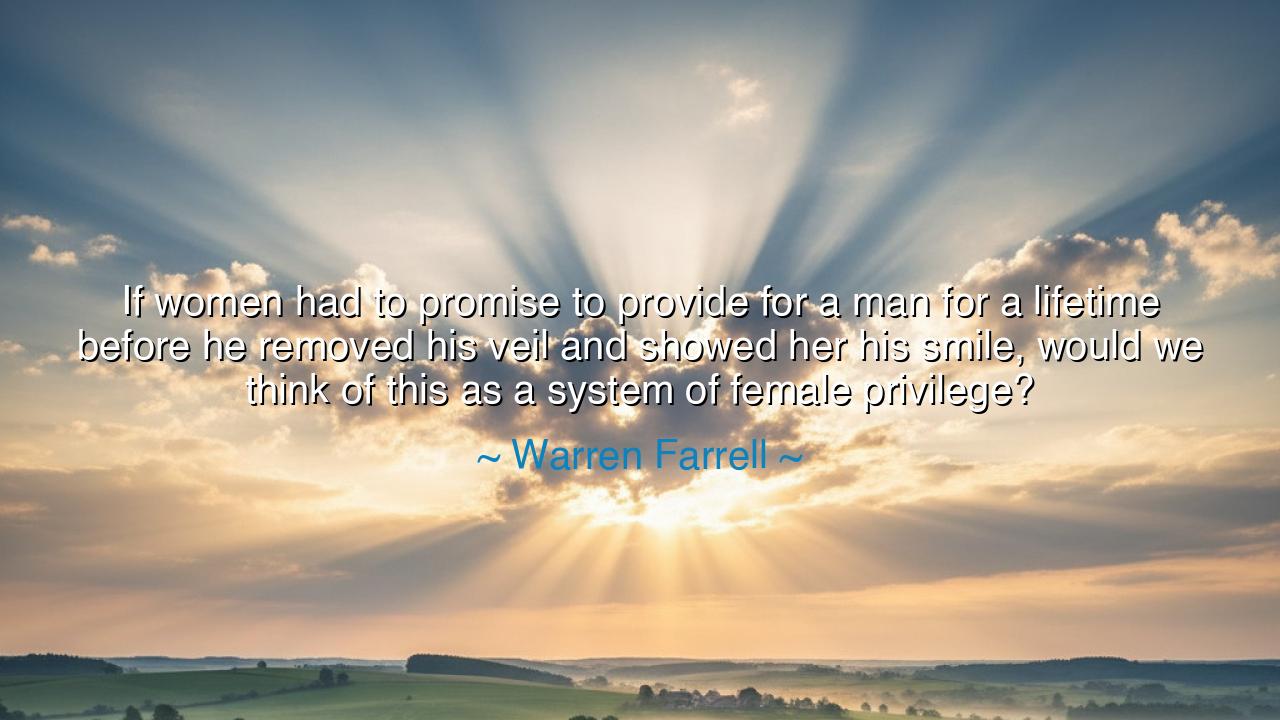
If women had to promise to provide for a man for a lifetime
If women had to promise to provide for a man for a lifetime before he removed his veil and showed her his smile, would we think of this as a system of female privilege?






Hear the words of Warren Farrell: “If women had to promise to provide for a man for a lifetime before he removed his veil and showed her his smile, would we think of this as a system of female privilege?” At first glance, these words appear like a riddle, but within them lies a profound reflection on the nature of roles, expectations, and what we call privilege. Farrell invites us to step outside the familiar arrangement of the sexes and to imagine it reversed, so that what seems natural to us may suddenly appear strange. In this mirror, he asks us to see clearly the weight carried by men—the expectation to provide, to labor, to stand as the shield and the storehouse for another’s security.
For in truth, the smile is no trivial thing—it is the symbol of openness, intimacy, the unveiling of one’s true self. In Farrell’s vision, the man must conceal his smile behind a veil until the woman vows lifelong provision. This reversal shocks us, for it exposes the unspoken truth that men, for generations, have been judged by their capacity to provide before they are cherished for their humanity. It is not love they are first asked for, but duty. It is not spirit that is unveiled, but status. The quote, then, is not about bitterness, but about perspective, showing how what we call privilege often depends on where one stands.
The ancients, too, grappled with such questions of burden and exchange. In the epic of The Odyssey, Penelope waits, weaving by day and unraveling by night, her power rooted in patience and cunning. Odysseus, meanwhile, must wander, labor, and prove himself through trials before he may reclaim hearth and home. Each bore a weight, yet different in form. Farrell’s words remind us that societies often conceal these weights by naming one side as “privileged” while ignoring the silent cost borne by the other. To switch the roles, even in imagination, is to awaken the mind to the unseen sacrifices of men.
Consider also the knights of medieval Europe, bound by oath to protect their ladies and lords. Their armor was not only metal but expectation. To fall short in provision or in valor was to lose honor, love, and often life. Women of the courts were seen as precious, their favor as reward, while men carried the burden of risk and sacrifice. If, as Farrell says, women had been forced to promise provision before a man unveiled his smile, we would have called it absurd. Yet when men must do so, it is named tradition. The quote, therefore, seeks not to condemn, but to unmask the system that is so old it appears invisible.
And yet, this teaching is not a call for resentment but for balance. For when one sex bears the weight of provision and the other bears the weight of dependence, both are trapped. The man is reduced to his wallet, the woman to her need. The veil hides not only the man’s smile, but the possibility of a union rooted in freedom and equality. Farrell’s provocation asks us to see that love cannot flourish when it is built on bargains of obligation rather than the meeting of whole beings.
The lesson for us, then, is clear: we must question the roles we inherit, even those that appear natural. Ask yourself—what burdens do I carry that are unseen? What expectations have been placed on me not by love, but by tradition? And ask also—what burdens are carried by others that I have failed to see? In this reflection, compassion is born, and from compassion, justice.
So let us pass down this wisdom: do not accept the veil of tradition without thought. Do not confuse privilege with freedom, nor burden with honor. Seek instead relationships where the smile—that symbol of true self—is unveiled not through bargain, but through mutual respect, mutual care, and shared responsibility. For only then will men and women alike walk unveiled, free, and smiling in truth.






AAdministratorAdministrator
Welcome, honored guests. Please leave a comment, we will respond soon